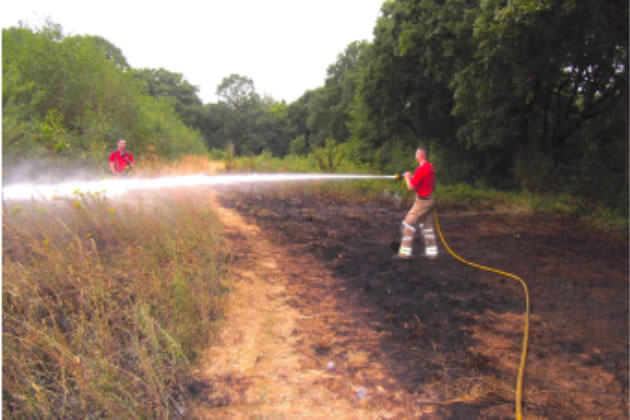Warnings Made over Repeat of Last Year's Wildfires
High temperatures caused 'catastrophic harm' in Ealing's open spaces

Firefighters damp down Whittlers' Wood in 2022. Picture: David Harvey
June 26, 2023
Conservationist groups have warned of “catastrophic harm” to people, plants and animals as London faces the start of wildfire season. Last summer, record temperatures created the perfect conditions for the start and spread of wildfires leading to a massive outbreak in July.
Fires were so intense that the London Fire Brigade declared a major incident and later announced that 19 July had been the brigade’s busiest day since World War II, with 2,670 calls taken in one day and more than 40 houses destroyed by grass and open land fires. Hot and dry conditions are a huge concern not just for people but also for a number of London’s nature reserves.
The British Ornithological Trust has warned that recent climate change has led to a massive drop in the number of wild birds in Britain. Its figures show a decline of 73 million birds over the past 50 years.
Part of this is the increased prevalence and intensity of wildfires which destroy habitats and even kill fleeing animals. Birdwatching app, Birda says its experts are incredibly concerned.
Against the backdrop of a heatwave and lack of rainfall, London wildfire risks are now escalating, prompting firefighters such as London Fire Brigade to adopt techniques honed in the world’s worst wildfire hotspots such as Greece, Portugal and Spain. As climate change heightens the risk level this summer, it becomes increasingly apparent that wildfires pose a major threat to wildlife and nature reserves.
Rewilded areas of London, like Warren Farm in Ealing, say that the threat of wildfires poses an “increased risk of catastrophic harm to people, animals and plants.” Warren Farm is a reserve which is particularly well known for its rare bird populations and large areas of wild grasslands, exactly the sort of place that would be at risk from a nasty blaze.
London has been working on its wildfire preparedness, according to Mayor Sadiq Khan. A representative from Warren Farm praised the LFB’s response to fires during last year’s heatwave. They said: “Last summer, London Fire Brigade did an amazing job in stopping fires from harming wildlife and visitors in the Brent River Park during the heatwave. There were a number of fires in local parks, many of which could have been avoided.
“In this hot weather, there is an increased risk of catastrophic harm to people, animals and plants. There is a ban on portable barbecues in Ealing’s parks and we ask people to take extra care when disposing of bottles and cigarettes. Fires spread rapidly in dry weather. We are asking people not to give them a helping hand.”
Sadiq Khan says the fire services are ready as they can be but that they are worried about more than just fires. On wildfires, he said: “It’s a really serious and important issue that we are currently grappling with in relation to just being prepared. If you remember last year one of the big problems we had was a period of no rain which meant the grass became hay-like so when there was a spark the fire spread quickly because of the hay-like nature of the grass.
“We saw last year, the fire brigade have the busiest day it’s had since the blitz in WWII. One of the things we have got to do is make sure people are aware of the consequences of their actions don’t use a disposable barbecue that can be really dangerous because things can catch fire very quickly. If you are having a barbecue at home and god forbid there was a fire it’s important to ensure you have the resources at home in order to deal with that.
He added that people should be cautious about how they cool off in the hot weather. “Other things we learnt from last year is people often try and cool off by jumping in a river, don’t do that. We had a few cases of people drowning last year as well.
While the firefighters are ready there are follow up consequences to wildfires that the Mayor of London say they are also considering, “The fire service is ready, as ready as they can be. The other thing that follows wildfires is flash flooding because you often have thunder and lightning very soon afterwards. So we are also preparing for the possibility of flash floods across our city. One thing we did last year, was write to people who might be affected, people in basement flats, near stations, and businesses and we will need to do that again this year.”
Rory Bennett - Local Democracy Reporter